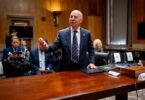Ata Mohammad Noor
Afghanistan faces a number of challenges internally and externally. Security and corruption are near the top of the list, but fixing Afghanistan’s debilitated political system deserves greater attention.
For the past four decades, the people of Afghanistan have been suffering from perpetual conflict, instability and poverty. We were victims of the Soviet invasion in the 1980s and are facing a foreign-backed insurgency and terrorism since the turn of the millennium.
Our people successfully fought and defeated the Soviets with the generous help of our Western allies and rendered enormous sacrifices in the resistance against terrorism in the 1990s. Albeit, at the time, western nations largely failed to recognise the threat that terrorism posed to global peace and security. Afghanistan has made significant strides towards building a peaceful, prosperous and democratic nation.
Than forty nations have contributed troops to ISAF and NATO’s Resolute Support Missions and provided the Afghan National Security and Defense Forces (ANSDF) both with technical and financial support. The United States alone has spent more than US $700 billion in its war efforts and contributed approximately $117 billion for reconstruction of Afghanistan.
There is no doubt that our people are grateful for the support and sacrifices of our international partners in Afghanistan. Despite significant investments and achievements over the last 16 years, the challenges remain widespread.
The Taliban insurgency is expanding, the ANDSF is still heavily dependent both operationally and financially, and the fragile political system is teetering under the burden of rising ethnic tensions. International commitment cannot be open-ended and this level of support is not sustainable. There is an urgent need to reconsider our assumptions and the political calculus that underlines our approach.
One of the main reasons for the continued conflict in Afghanistan has been our failure to create a conducive environment to enlist Pakistan’s support in bringing the Taliban and the Haqqani Network to the negotiating table. Although our efforts have been ignored for years, the new US strategy acknowledges this fundamental problem and addresses it by applying pressure to change the approach in our region.
I am sure if sustained, the new US strategy could be translated into success in the battlefield and result in improved security for an eventual political settlement with the Taliban.
A broken system: A massive challenge for Afghanistan is fixing its dysfunctional political and governance system. The 2004 constitution of Afghanistan created a presidential system with more powers than an absolute monarchy that lacks a robust system of checks and balances over the presidency.
It has created a highly centralised system in an ethnically diverse country with a long tradition of a devolved system of governance. Traditionally, the balance of power was maintained through unwritten pacts between the centre and the peripheries, accounting for the interests of different regions and ethnic groups with the regions having practical autonomy to decide on matters of service delivery and governance – but these unwritten pacts have never been institutionalised or formalised through the constitution. The presence of international troops and political support for Afghanistan have been misinterpreted as the international community’s backing for a centralised political system in Afghanistan, and emboldened the central government to pursue an aggressive agenda to consolidate power for the presidency.
This undermines the traditional balance of power and deepens social and political fault-lines. There is an old saying that goes “power tends to corrupt, and absolute power corrupts absolutely.” Afghanistan is a prime example where corruption is rampant and patronage and ethnic considerations have replaced merit-based government appointments leading to inefficiencies and waste in public administration. While the ANDSF have bravely fought and given enormous sacrifices, they have suffered from weak leadership due to the fact that in most cases senior appointments are based on ethnicity, loyalty to the ruling elites, or how they can serve vested interests in the next election rather than on merit.
The centralisation of power has led to a disconnect between the people and the government and a lack of accountability, which has in turn unbalanced national budgets, increased delays in approvals for development projects, uneven growth and development across the country, and inefficiencies and waste in implementation and delivery of development projects. More importantly, it has led to a centralised system of corruption. Presidential elections have become a destabilising factor in Afghanistan with political groups resorting to ethnic politics to mobilise support.
The fraudulent 2014 elections took us to the brink of civil conflict, threatening the integrity and the very existence of our country. Though we had won the elections in 2014, we entered into a partnership to form the National Unity Government to avert a crisis for the sake of our national interests and for stability in Afghanistan.
Electoral reform was one of the key issues in the NUG agreement but there have only been cosmetic changes with the president appointing loyalists in electoral commissions, disregarding the protests by political parties, civil society and the general public.
The existing Election Commission has neither independence nor the capacity to hold free and fair elections. Widespread and rampant centralised corruption, mismanagement, monopolisation of power, marginalisation of NUG partners, rising ethnic tensions and insecurity have brought Afghanistan to the brink of collapse. There have been concerted efforts to resolve the political crisis since President Ghani announced that I resigned as Balkh Governor. We have presented a 12 point reform agenda as agreed in the NUG Agreement which focuses on the following demands:
– Fix the dysfunctional political and administrative system and create a system of checks and balances to prevent our descent into a dictatorship.
– Reform of the Electoral Commission to make sure elections are free and fair with results acceptable to the people.
– Decentralise the system to empower people, increase administrative efficiency, and lower the stakes so that a presidential election is no longer a race for everything versus nothing.
– Create local ownership with people having a stake in development, governance and security through their voices, and the accountability of authorities.
– Invest in a democratic system which lasts beyond the tenure of a specific leader or President.
These demands will help create a conducive and enabling environment in Afghanistan for the new US strategy to yield results and succeed in defeating the menace of terrorism. We urge our international partners to support Afghanistan by backing the reforms that our people want rather than an individual or a small clique with narrow interests.
Unless we reform, democratise and fix the dysfunctional political system, neither the Afghan people nor our international partners can succeed in building a secure and peaceful country which can bring prosperity to our people, and prevent our soil from being used by terrorists. We are not only allies with the international community in fighting against terrorism but also in reform, democratisation, development, and fighting corruption through building lasting institutions.






